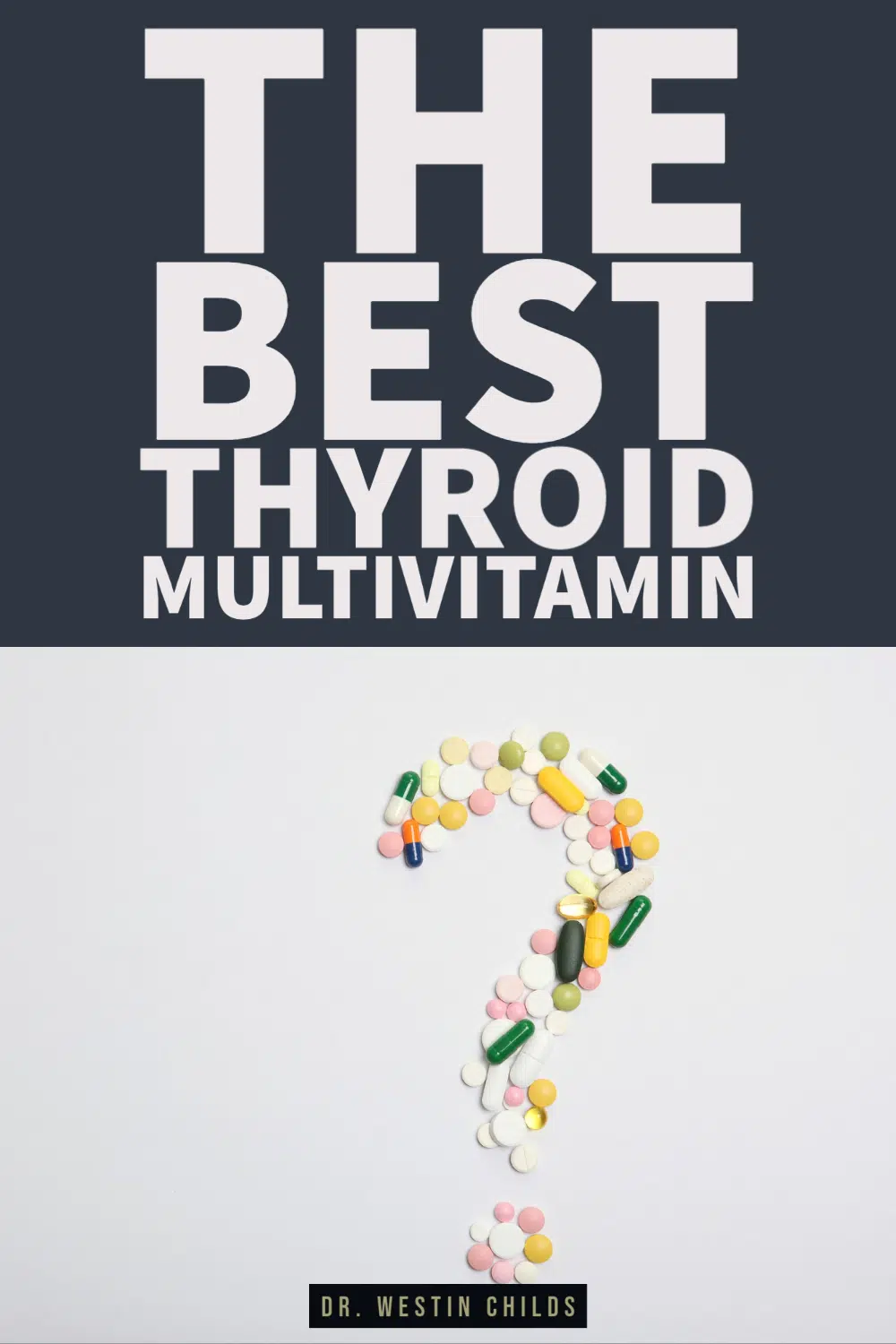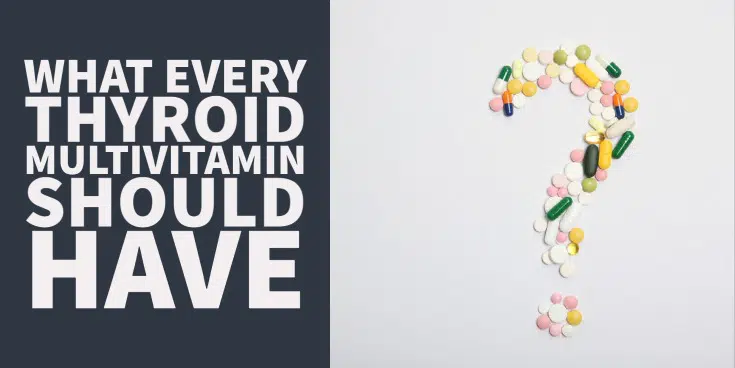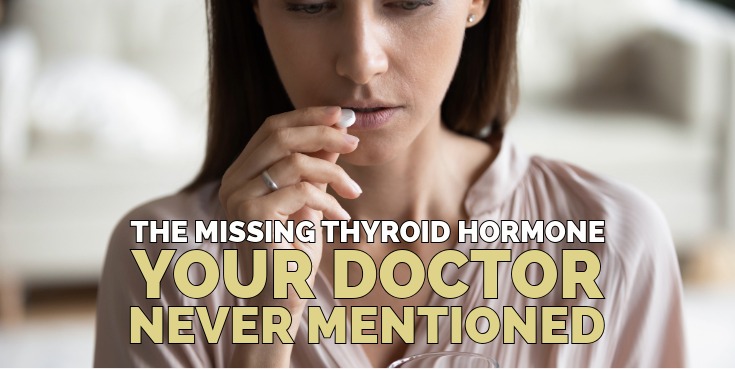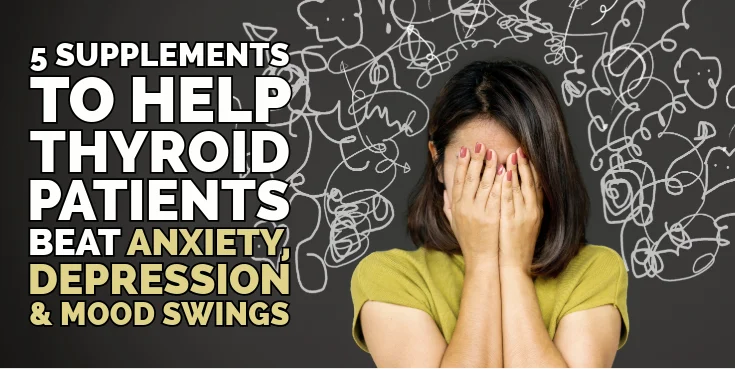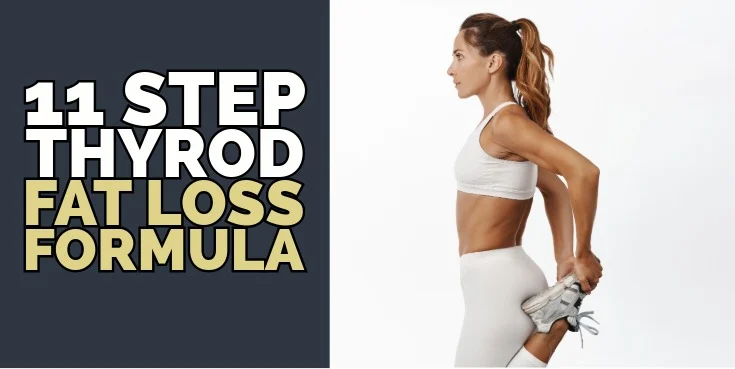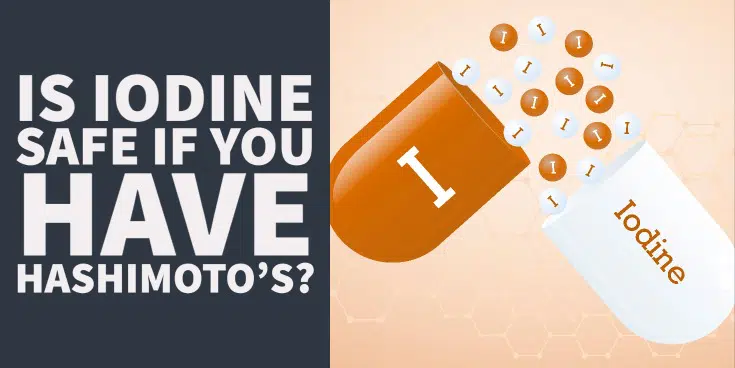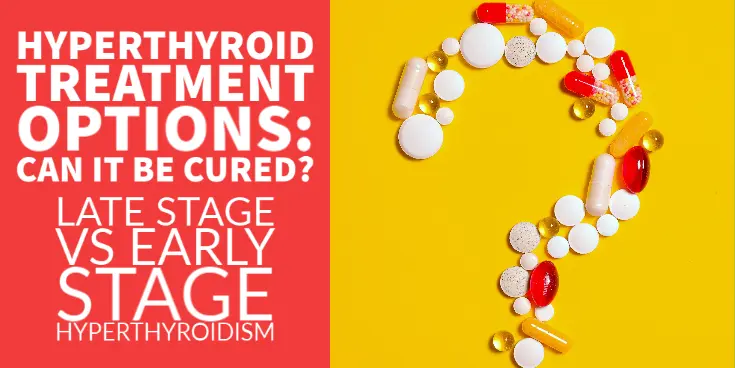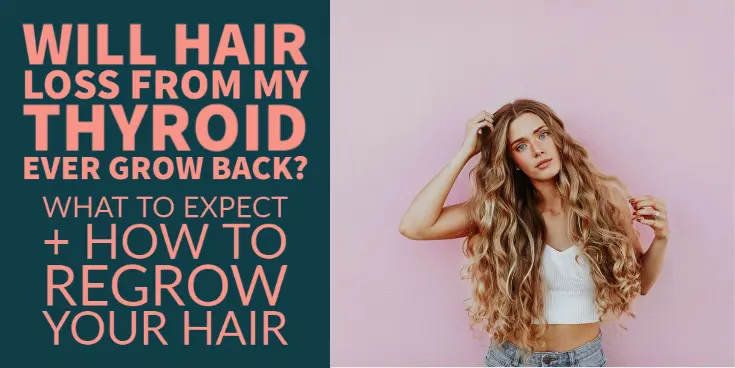Taking a multivitamin is an easy way to get the exact nutrients that your thyroid needs to function optimally.
You may be surprised to find out that many thyroid patients are walking around with suboptimal nutrients without even knowing it.
Suboptimal levels of each nutrient aren’t really a big deal but when you start to add several on top of each other it can turn into something that you feel.
Imagine having only a 5% suboptimal level in your zinc status.
By itself, that’s not really a big deal.
But what if you are also slightly deficient in selenium, glutathione, and vitamin B12, iodine, and so on?
That small 5% value starts to add up and may be felt symptomatically by thyroid patients.
This is where a thyroid multivitamin comes into play.
Multivitamins contain a broad array of vitamins and nutrients that your thyroid needs.
But there’s one big problem:
A standard multivitamin usually will not do the trick.
Thyroid patients have special needs compared to the average population and these needs must be met in order to feel well.
In this article, you’ll learn which nutrients your thyroid needs, how to support your thyroid gland with a thyroid multivitamin, if you should use one, the role it plays with other supplements, and much more.
DOWNLOAD FREE RESOURCES
Foods to Avoid if you Have Thyroid Problems:
I’ve found that these 10 foods cause the most problems for thyroid patients. Learn which foods you should avoid if you have thyroid disease of any type.
The Complete List of Thyroid Lab tests:
The list includes optimal ranges, normal ranges, and the complete list of tests you need to diagnose and manage thyroid disease correctly!
What Your Thyroid Needs
Most people are surprised when I tell them that their thyroid requires at least 13 different nutrients in order at an optimal level.
These nutrients work at various levels of thyroid function including the production of thyroid hormone, the conversion of thyroid hormone, and cellular sensitivity to thyroid hormone.
While it is impressive that your thyroid gland needs all of these nutrients, it’s not much different from other hormone systems in the body.
But, when it comes to the thyroid, there is one big difference you should know:
Your thyroid seems to be much more sensitive to small nutrient deficiencies than other systems in your body.
Your body is designed to be able to function optimally even without all of the 100% correct inputs.
In other words, it has the ability to make up for some losses here and there.
This built-in system works well for things like your liver but doesn’t seem to translate to the thyroid.
Even small deficiencies in critical nutrients such as zinc, selenium, or iodine may result in big symptoms for you.
This problem is amplified in many disease states including conditions such as Hashimoto’s thyroiditis and hypothyroidism.
Why?
Because being in a low thyroid state increases your risk of developing nutrient deficiencies by impacting your gut!
So not only are you more sensitive to small nutrient deficiencies, your thyroid creates an environment in which they are more likely to appear.
For these reasons, and more which we will soon discuss, taking a thyroid multivitamin becomes an obvious answer.
Why not provide your thyroid gland with the very nutrients it needs to function each and every day?
It makes a lot of sense.
But before you run out and buy a standard multivitamin, you should be aware that your thyroid has unique needs compared to other systems in your body.
This means you will want to find the right multivitamin that takes these needs into account.
This also means that most standard multivitamins won’t cut it.
Do Supplements Help?
Before we dive into the specifics of what a thyroid multivitamin should contain, we need to talk about how supplements help your thyroid in general by answering this question:
Can supplements actually help your thyroid to function better?
And the answer to that question is yes, they have the potential to help.
Having said that, you shouldn’t expect your thyroid multivitamin to be a miracle worker or to necessarily take the place of your thyroid medication.
While I can attest to the fact that thyroid supplements can be very effective (this is based on over 80,000+ thyroid patients using my supplements over the past 5 years), they should always be used in the right context.
Thyroid supplements work by providing your thyroid with the necessary nutrients that it needs to function.
For instance:
Imagine that your body does not have sufficient levels of Vitamin D (which would not be surprising considering that up to 40-50% of the population is Vitamin D deficient (1)).
We know that Vitamin D plays a critical role in regulating calcium in your body but it also plays an important role in regulating your immune system (2).
Those people who have autoimmune thyroiditis (otherwise known as Hashimoto’s thyroiditis) tend to have low vitamin D levels which may contribute to their autoimmune disease.
Replacing vitamin D to optimal levels may be one way to help support your immune system thereby improving thyroid function.
Is Vitamin D the miracle that cures Hashimoto’s in this case? Not at all, but it is certainly pushing your body and immune system in the right direction.
A direction that allows for healing and optimization of immune function.
Let’s consider another example:
This time imagine a scenario in which you are deficient in zinc.
It is estimated that up to 35-45% of people are not consuming enough Zinc in their diet (3) so, again, this isn’t a far-fetched example.
We know from various studies that zinc plays a critical role in thyroid conversion of T4 to T3 (4).
Low levels of Zinc have been shown to create a hypothyroid-like state which is completely resolved with supplementation.
In this setting, providing your body with zinc allows for the natural process of thyroid conversion to occur unimpeded.
There’s nothing magical about zinc supplementation except the fact that your thyroid needs it to function!

This same line of thinking can be extended to other nutrients such as iodine, vitamin B12, vitamin A, vitamin E, selenium, tyrosine, and more.
Hopefully, this is making sense.
And with this in mind I want you to ask yourself the following questions:
When was the last time you had any of these nutrients tested? When was the last time that your doctor talked to you about supplementing with any of these nutrients? Has your doctor ever recommended anything more than just thyroid medication?
If you are like most thyroid patients then these topics are never brought up during your doctor’s visits.
Fortunately, you can take matters into your own hands with the use of supplements.
What to Look for in a Thyroid Multivitamin
If you do decide you want to jump into the world of thyroid supplementation then you want to make sure that you do it correctly.
I would strongly advise against walking into your local grocery store and purchasing the first multivitamin you see.
Instead, you want to pay close attention to certain elements because, as I mentioned earlier, your thyroid is unlike any other hormone system in your body.
When searching for a thyroid multivitamin, try to find one with the following characteristics:
- Find a broad-spectrum multivitamin that contains at least 15+ different nutrients.
- Ensure that your supplement contains these very important nutrients: zinc, selenium, iodine, vitamin D, and magnesium (other nutrients are important but these are especially important for your thyroid).
- Ensure that the B Vitamins found in your multivitamin are pre-methylated (or already activated) and safe to use for those with MTHFR genetic defects (5).
- Try to find supplements with “added” ingredients to help reduce or manage inflammation (inflammation can decrease thyroid hormone production).
- Try to find supplements with “added” ingredients that may support thyroid function (this can include botanicals or adrenal adaptogens (6)).
- Look for supplements or ingredients that also enhance gastrointestinal function (GI function is important for thyroid activation and conversion (7)).
Reading this list it may become obvious that it will be difficult (or impossible) to fit all of these nutrients into one single capsule.
Instead, more likely than taking 1-2 capsules per day, you’ll need to take several different supplements to meet all of the needs of your thyroid.
This is not unusual!
And I can tell you from experience that the thyroid patients who tend to feel better are often taking anywhere between 3-6 different supplements (once you get up to the 10+ range you are often doing more harm than good).
It’s just simply not possible to jam-pack a small dissolvable capsule full of all of these important ingredients and the levels your thyroid needs.
My personal recommendation is to use a supplement such as this one, which has been formulated to contain all of the necessary ingredients that your thyroid needs.
You do not have to use this exact supplement, however, so feel free to look around for others if you desire.
Just make sure that you find one that hits all of the criteria listed above and one that has similar ingredients as my Thyroid Daily Essentials.
I’ve spent the time to formulate it specifically for thyroid patients based on all of my research and experience in the field.
You might as well take advantage of that information even if you don’t want to use my supplement!
It doesn’t matter to me what supplement you use so long as you are taking steps to help manage your thyroid.
Supplements vs Medications (They are NOT the same)
While supplements can definitely help out your thyroid it’s important that you place a distinction in your mind between over-the-counter supplements and prescription thyroid medications.
Supplements are available over the counter and help SUPPORT your thyroid by helping your thyroid gland function more optimally.
Thyroid medications are completely different.
They provide your body and thyroid gland with exact replicas of the hormone that it would produce if it could function on its own.
Thyroid medications (including Synthroid, levothyroxine, NDT, and T3 medications) require a doctor’s prescription so they are more difficult to obtain compared to supplements.
Both thyroid supplements and thyroid medications serve different purposes entirely and you should not stop taking your medication if you start using thyroid supplements.
This doesn’t mean that it’s impossible for you to eventually get off of your thyroid medication at some point in the future.
In fact, we know that up to 30% of thyroid patients may not need to take their medication and can possibly be weaned off.
But figuring out if you fit into that 30% is very important so you should never try to wean yourself off of your medication without physician supervision.
Read this article if you want to find out if you are among the lucky 30% of thyroid patients who may be able to get off of their thyroid medication.
Another point worth mentioning is that thyroid supplements, including a thyroid multivitamin, can potentially enhance the effectiveness of your thyroid medication.
In other words, vitamins and nutrients may help your thyroid medication (such as levothyroxine) work better.
This is exactly why taking supplements in conjunction with thyroid medications can be so effective.
Because they work via different mechanisms they are considered complementary to one another.
Thyroid Multivitamin vs Other Thyroid Specific Supplements
This is actually an important topic.
I’ve been asked some form of the following question at many points over the last 6 years of helping thyroid patients:
“Is there an all-in-one supplement I can take that includes all of the things my thyroid needs?”.
And while the answer is technically yes, using this method won’t help you the way that you think it will.
The reason is simple:
Your thyroid influences just about every other system (including your hormones) in your body.
So when your thyroid is not functioning optimally, it results in a cascade of problems downstream.
These problems can manifest as adrenal issues, gut-related problems, susceptibility to infections, sex hormone imbalances, and more.
To make matters worse, each person is affected differently than the next.
In other words, the supplements that YOUR body needs will be different from the next patient with thyroid disease and so on.
To further complicate the picture, we also need to take into account genetic variations among individuals in how they both process and metabolize thyroid hormones and even some supplements.
What does this mean for you?
In a nutshell, it means you want to try and individualize your supplements to the problems that you are facing.
Easier said than done, though, I know.
Taking certain factors into account can make this process easier:
- Genetic variations in thyroid hormone metabolism and processing
- Diminished T4 to T3 conversion
- Cortisol abnormalities
- Sex hormone abnormalities
- Insulin/leptin resistance
- Diet (what nutrients are you already getting from your food?)
- Stressors and demand for certain nutrients
I don’t mean for this to be confusing to you at all.
I am just trying to illustrate the point that taking a thyroid multivitamin, while certainly helpful and better than nothing, may not be the “complete package” that you think it will be.
Taking a thyroid multivitamin is likely to help you feel better but if you want to get back to 100% that may require the use of additional supplements.
How to Take Your Thyroid Multivitamin For Best Results (Duration, Frequency, & More)
If you decide to use a thyroid multivitamin how long are you supposed to take it?
Is it safe to take it with your thyroid medication?
Can you take other supplements if you also take a multivitamin?
The answers to these questions are important because they impact whether or not your supplements will work!
For this reason, let’s discuss some of the basics about how to take your multivitamin (and other thyroid supplements) correctly.
How long can you take a thyroid multivitamin?
Multivitamins are designed to provide your body with additional nutrients each and every day.
Thyroid multivitamins provide not only your body the nutrients that it needs but also your thyroid gland.
The idea is that your multivitamin will act as a supplement to whatever nutrients you are getting from your diet to ensure that the combination results in an adequate amount for proper function.
Because of this, they are designed to be taken indefinitely.
You may not necessarily need to take it every day for the rest of your life, though.
In many cases, taking a multivitamin daily for 3-6 months is enough to replace lost levels of nutrients while also building up a good reserve.
This reserve can then act to supplement the nutrients that you need when you can’t get them from your diet (for whatever reason).
On the flip side, you can also safely take a thyroid multivitamin every day if you like the idea of having that safety net to fall back on so you don’t have to worry about ensuring you get all of the nutrients from your diet every day.
Can a thyroid multivitamin be used with other supplements?
Yes!
A thyroid multivitamin should not necessarily be the only supplement that you use.
While it can be helpful, especially for those who are new to thyroid disease or thyroid management, there are plenty of other beneficial supplements that should be considered by thyroid patients.
Among these include:
- Supplements designed to support adrenal function
- Supplements designed to enhance T4 to T3 conversion
- Supplements designed to help regulate mood and depression
- Supplements designed to help enhance hair growth
- Supplements designed to help balance gut bacteria and gut function
- Supplements designed to help with weight loss, to help build muscle, and manage your appetite
Diving into these supplements can really help to enhance your overall quality of life (provided you use them correctly and in conjunction with other therapies!).
Can you take a thyroid multivitamin with your thyroid medication?
Yes, as long as it is taken correctly!
It is safe to use the thyroid multivitamin that I recommend with all thyroid medications as long as it is taken at least 30-60 minutes away (either before or after) from your thyroid medication.
You should be aware that multivitamins that contain high levels of calcium and iron may negatively impact the absorption of your thyroid medication.
Multivitamins that contain low doses of iron and calcium are not as troublesome as supplements that contain high doses of either.
Is a thyroid multivitamin helpful if you don’t have a thyroid?
Again, the answer is yes!
How can a supplement designed to help support your thyroid work if you don’t have a thyroid?
I know it may sound counter-intuitive but let me explain:
Most people who don’t have a thyroid automatically assume that none of the information relating to hypothyroidism is relevant to them, but that couldn’t be farther from the truth.
What most people fail to recognize is that every single person who is alive has a need for thyroid hormone.
Those without a thyroid may not realize that they are still getting thyroid hormone from their thyroid medication.
And this medication is required.
You can either get your thyroid hormone from your thyroid gland (if it’s still working) or from thyroid medications like levothyroxine but either way, you must get it.
No matter how you get thyroid hormone into your body it still must go through the same cellular steps in order to be activated, converted, and utilized by your body.
And these 3 steps (activation, conversion, and utilization) occur OUTSIDE of the thyroid gland (8)!
Your body does not care if you have a thyroid gland because the action of thyroid hormone occurs in your CELLS and not in the thyroid gland.
This means it doesn’t matter if you take thyroid medication by mouth, your body still requires nutrients in EACH cell in order to use that thyroid hormone effectively.
In addition, even if you don’t have a thyroid gland you still have other tissues in your body that influence your thyroid hormone.
Tissues like cortisol, gut health, and liver function, can all impact your thyroid indirectly.
Taking supplements for these systems is a way to treat your thyroid indirectly.
Remember:
If you’ve had your thyroid removed, or destroyed by RAI, you should consider yourself to be hypothyroid (even if the reason you had your thyroid removed was due to hyperthyroidism).
When you start thinking about your thyroid in this way your view of your thyroid gland and which therapies you need become more clear.
I think one of the worst things you can do is avoid taking nutrients and supplements if you don’t have a thyroid (or if it’s been destroyed by RAI) because you are in a situation where you need them even more than people who have a thyroid gland.
If you want to, and I would recommend that you do this, please read this article which contains much more information on this exact topic.
Conclusion
So, should you use a thyroid multivitamin?
You’re the only one that can decide but I hope this information helps steer you in the right direction.
While supplementing may not be a life-changing experience (although it can be incredibly beneficial for some people), it may help provide even a 10-20% increase in thyroid support which can mean the difference between feeling fatigued in the afternoon or having sufficient energy and concentration to finish out your day.
Treating your thyroid is not about slam dunks but instead about taking small wins over and over.
Eventually, these small wins add up and you will feel yourself getting back to 100%.
Now I want to hear from you:
Did you know that thyroid patients have specific and unique needs compared to other people?
Have you used a thyroid multivitamin before? If so, which one?
Did you find that taking a thyroid multivitamin helped you to feel better?
If you don’t have a thyroid, are you still supplementing to support your thyroid?
Please leave your questions, comments, or concerns below to keep the conversation going!
Scientific References
#1. https://www.ncbi.nlm.nih.gov/pubmed/21310306
#2. https://www.ncbi.nlm.nih.gov/pmc/articles/PMC3921055/
#3. https://ods.od.nih.gov/factsheets/zinc-healthprofessional/
#4. https://www.ncbi.nlm.nih.gov/pubmed/8157857
#5. https://www.ncbi.nlm.nih.gov/pubmed/28689805
#6. https://www.ncbi.nlm.nih.gov/pubmed/28640972
#7. https://www.ncbi.nlm.nih.gov/pubmed/3049061
#8. https://www.ncbi.nlm.nih.gov/pubmed/6841556
